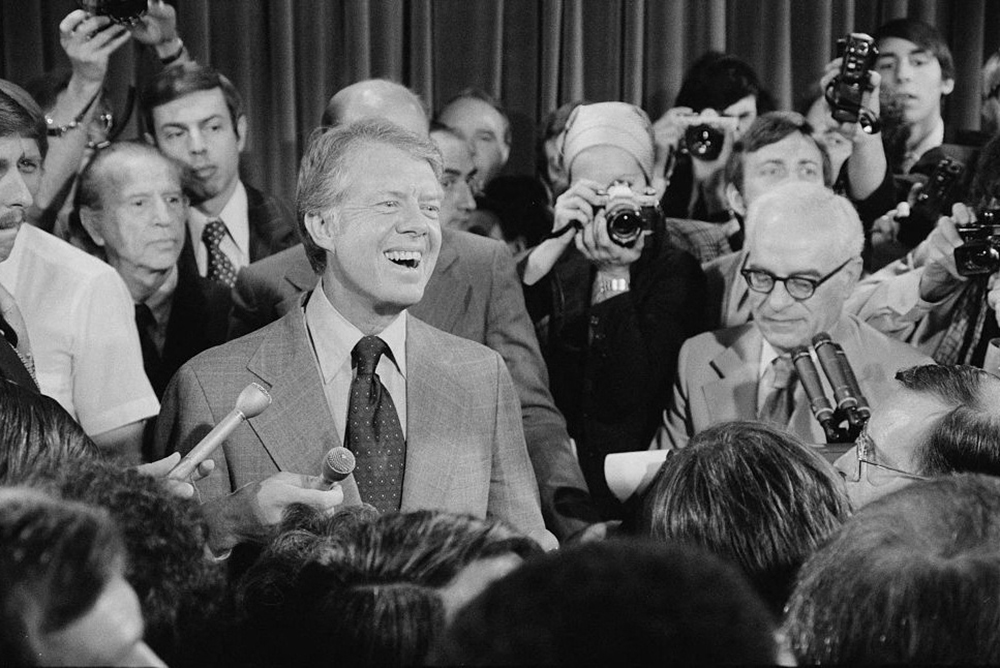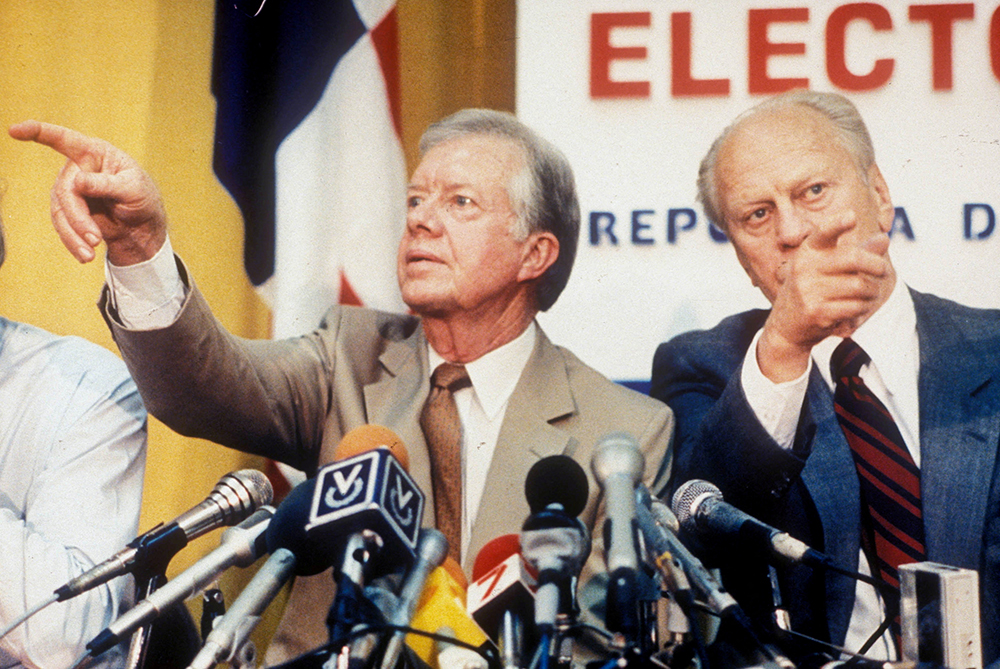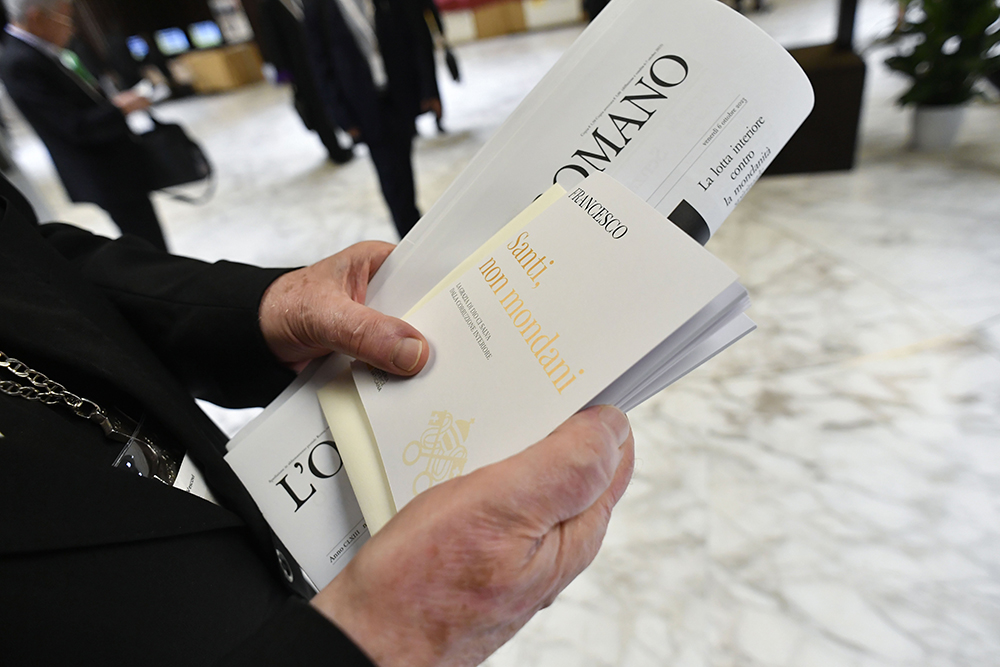
President Jimmy Carter attends a press conference, surrounded by journalists, June 13, 1977. (Library of Congress/Thomas J. O'Halloran/Handout via Reuters/file photo)
Since the passing of former President Jimmy Carter on Dec. 29, 2024, there have been numerous reviews of his record, both positive and negative. Two matters, however, are not in dispute, his faithfulness to Christianity and his bold enactment of groundbreaking laws against corruption. Both were intimately connected.
Carter was proud to be an evangelical Christian and the first American president to welcome a pope to the White House (Pope John Paul II in 1979). He often said that his intimate faith guided his actions as much when he was president of the United States as it did before and after his time in office.
Carter was deeply knowledgeable about the Bible and became known as "the world's most famous Sunday School teacher." He could recite many passages from the good book, including those condemning different forms of corruption. Early on, God commanded, "Do not accept a bribe, for a bribe blinds those who see and twists the words of the innocent" (Ex. 23:8).

Former U.S. Presidents Jimmy Carter and Gerald Ford point in different directions while calling on reporters wanting to ask questions at a press conference in Panama City, Panama, May 5, 1989. (Reuters/Dematteis/File photo)
Two enactments in particular reflected Carter's animosity towards corruption. The first was the Foreign Corrupt Practices Act of 1977. During his presidential campaign, Carter derided President Gerald Ford's "proposal to allow corporations to engage in bribery so long as they report such illegal transactions to the Department of Commerce." As Rep. Michael Harrington stated after Carter took office, "we now have an administration whose prime foreign policy concern to date has been to restore morality and ethical principles to all of our international relations."
Eleven months later, Carter signed the Foreign Corrupt Practices Act, the first law in the world to impose severe criminal penalties (up to 20 years imprisonment) for bribing officials in foreign countries. In his signing statement, the president made clear his view that "bribery is ethically repugnant and competitively unnecessary."
The second enactment was the Inspector General Act of 1978, which created inspector general positions and offices in more than a dozen departments and agencies in the federal government to investigate fraud and abuses, and set standards to ensure the independence, integrity and effectiveness of inspectors general in their oversight roles.
At the signing ceremony, Carter said, "I think it's accurate to say that the American people are fed up with the treatment of American tax money in a way that involves fraud and mismanagement and embarrassment to the government." He expressed his gratitude for "this chance to protect the taxpayer's dollar, to root out corruption, fraud, waste, mismanagement in the most effective and enthusiastic fashion."
Advertisement
"I think it's accurate to say that the American people are fed up with the treatment of American tax money in a way that involves fraud and mismanagement and embarrassment to the government."
— President Jimmy Carter at the signing ceremony of Inspector General Act of 1978
Carter's strong stance against bribery and corruption echoed that of President Theodore Roosevelt from 75 years before, "Corruption in every form is the arch-enemy of this Republic, the arch-enemy of free institutions and of government by the people, an even more dangerous enemy than the open lawlessness of violence because it works in hidden and furtive fashion." But even Roosevelt couldn't stop corporations from bribing government officials in other countries.
The world wasn't used to leaders clamping down on corruption, and it took another 20 years before other countries started to follow Carter's lead. But starting with the 1997 OECD Anti-Bribery Convention and the 2005 United Nations Convention against Corruption, countries such as England and Indonesia have enacted more laws and taken more actions against corruption than ever before in history.
Corruption threatens wherever money flows, and it is at the heart of every major planetary affliction from poverty and war to climate change and massive human migrations.
The Holy See has been struggling against this scourge for generations both in the general society and within the Vatican itself. Pope Francis describes the problem aptly — "Every time we accept a bribe and put it in our pocket, we destroy our heart, we destroy our personality and we destroy our homeland."

A member of the assembly of the Synod of Bishops carries a copy of the Vatican newspaper and the Italian edition of Pope Francis' book, "Holy, Not Worldly: God's Grace Saves Us From Interior Corruption," in the Vatican's Paul VI Audience Hall Oct. 6, 2023. (CNS/Vatican Media)
Since Francis took office in 2013, the Vatican has taken a number of significant actions to curb in-house corruption including the closure of 5,000 unauthorized accounts at the Vatican Bank, creation of an Office of the Auditor General, limiting the value of gifts that Vatican officials can accept to 40 euros (about $50), requiring senior Vatican officials to submit a declaration of assets every two years, and new rules to encourage the reporting of suspected corruption by public officials.
The Vatican reforms may finally be taking hold. Last May, the Holy See for the first time was at least partially compliant on all the money laundering and terrorist financing criteria assessed by MONEYVAL (a monitoring body of the Council of Europe). However, there is still much work to be done before it is fully compliant on every one of the 40 criteria.
Would all of these reforms at the Vatican and the capitals of so many countries be happening now in the 21st century if Carter hadn't had the faith and found the courage to fight for a strict Foreign Corrupt Practices Act in the 20th century? We'll never know, but we should all be thankful that he did.







